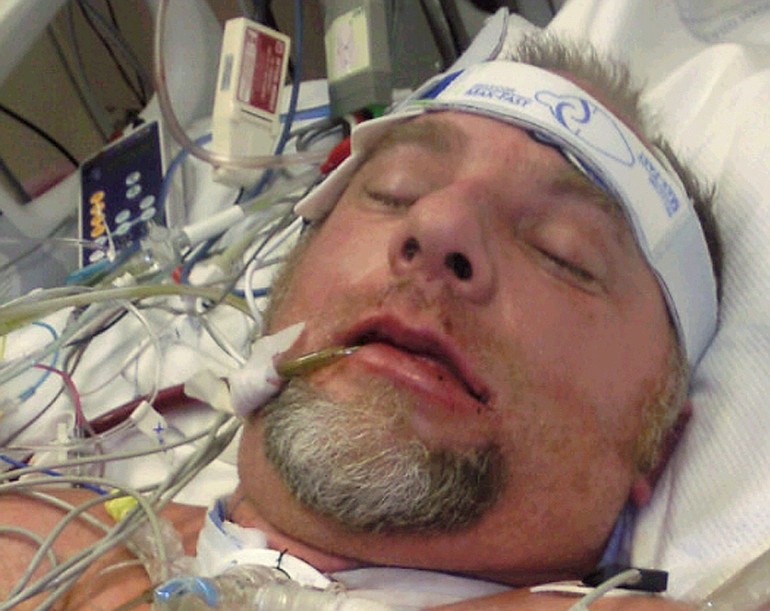From Sept. 19 through Jan. 23, five deaths in Clark County were attributed to H1N1 influenza; 132 patients were hospitalized with laboratory-confirmed swine flu, according to Clark County Public Health.
PORTLAND — Although federal officials indicate that the nation’s swine flu epidemic is tapering down, H1N1 influenza will be a big part of Tom Trautman’s life for quite a while.
The Camas resident is in intensive care at Legacy Emanuel Medical Center in Portland, recovering from the swine flu.
“He says he’s sore, weak, tired and he wants to go home,” Becky Trautman said.
An innovative therapy that oxygenated his blood outside Trautman’s body helped him survive swine flu. Now he is dealing with his fourth case of pneumonia since November and will remain in the hospital for another month.
When he does return home, Trautman will face up to a year of recovery and rehabilitation.
During her husband’s hospital stay, Becky Trautman will continue to live nearby, at her home away from home: the Legacy Emanuel parking lot.
“I’ve been staying in a trailer in the parking lot for three weeks now,” Becky Trautman said.
It’s been a period that a friend called both horrific and miraculous: horrific because Trautman almost died; miraculous because he lived.
There were times it was one step forward and three steps back, 19-year-old Cameron Trautman said Tuesday, while sitting with his mother in a hospital waiting room.
Tom has had several surgeries — he lost 14 pints of blood during one procedure — and was in a medically induced coma for a time, Becky said.
“H1N1 can be a bad disease,” said Dr. Andrew Michaels, a trauma surgeon who is treating Trautman at Legacy Emanuel. “Some people get very sick, and some of them die. Tom was going to be one of those.”
The 45-year-old Trautman has been a pretty healthy guy all his life, his family said — barring one or two annual bouts with bronchitis. That inflammation of the airways might have tipped Trautman into the high-risk category for H1N1.
Trautman’s lungs couldn’t keep up with his body’s demands for oxygen, which is one of H1N1’s worst-case scenarios.
“People die because they can’t get oxygen in their blood,” Michaels said. “The virus inflames the lungs, and they get red, swollen and painful.”
A patient can get help breathing with the mechanical assistance of a ventilator, but that doesn’t ease those respiratory problems. It’s like having someone run on a sprained ankle, Michaels said.
“Fortunately, Tom’s doctors at Kaiser recognized the condition,” Michaels said, and forwarded their patient to Legacy.
The Legacy Emanuel team had the equivalent of a crutch for Trautman’s “sprained” lungs, a system called extracorporeal membrane oxygenation (ECMO).
“Extracorporeal” means the treatment happens outside the body. Trautman’s blood was circulated by a tube system through an oxygenation machine, then returned to his body.
“Tom went on ECMO on Jan. 4 and came off on Jan. 16,” Becky Trautman said. “Thirteen days.”
The swine flu outbreak was first detected in April, so H1N1 treatment is a relatively new application of ECMO technology. The federal Centers for Disease Control and Prevention described its use on a patient with pneumonia and swine flu in a December publication.
The Legacy Emanuel campus is the only place in the Northwest that can offer ECMO therapy for patients ranging from newborns up through adults, according to the health care system.
Other support for the Trautmans has come from family, friends and the community. Church congregations have contributed food, gas money and prayers. Friends lent Becky Trautman the travel trailer that she calls home in the hospital parking lot.
A fund has been established at Wells Fargo Bank, and friends are working on fundraising events to help Tom and Becky and their five children.
It all will help Trautman come through his illness, Dr. Michaels said.
“He’s been sick. He’s had operations. He will have scars and anxiety,” Michaels said. “But he has a good family, and faith; he’s healing both physically and emotionally. He’s doing well.”




